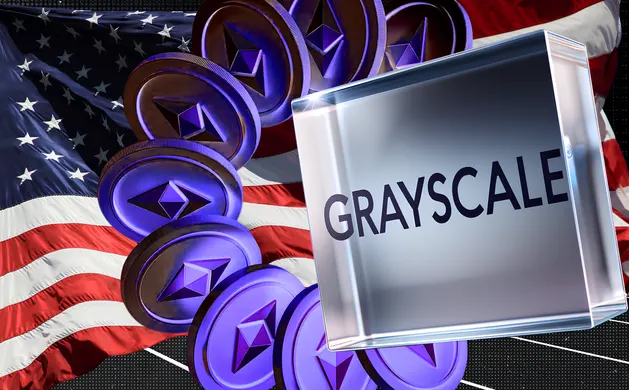Grayscale Introduces First-Ever Staking Ethereum ETFs

GM. Grayscale has introduced staking to its Ethereum ETFs, marking the first time US investors can earn staking rewards directly through exchange-traded products.
Meanwhile, Galaxy launches GalaxyOne for trading and yield, PancakeSwap debuts CakePad for early-access token sales, and the EU moves to centralize crypto oversight under ESMA.
The week continues with yield, launches, and regulators reshaping the global stage. 👇
Grayscale Introduces First-Ever Staking Ethereum ETFs
Grayscale introduced staking to its Ethereum Trust ETF (ETHE) and Ethereum Mini Trust ETF (ETH), the first such feature in the US. The SEC filing on Monday allows investors to earn staking rewards directly from the exchange-traded products for the first time.
The firm said Coinbase and a network of institutional validator providers will manage staked ETH, ensuring secure custody and yield distribution. Staking has also been enabled in Grayscale’s Solana Trust, pending conversion into an ETF, underscoring the firm’s expanding product scope.
Ethereum ETFs have trailed behind Bitcoin counterparts since launch, holding $30.5 billion in net assets compared to Bitcoin ETFs’ $164.5 billion. Analysts long attributed this lag to the absence of staking rewards, which had curbed institutional appetite for Ethereum exposure.
Grayscale CEO Peter Mintzberg called the step “exactly the kind of first-mover innovation” that defines the company’s strategy. Ethereum’s 156% surge in six months, alongside record ETF inflows of $1.48 billion last week, signals rising demand for yield-bearing crypto products.
Galaxy Launches GalaxyOne Trading and Yield Platform
Galaxy Digital launched GalaxyOne, a unified platform combining crypto trading, stock investing, and yield-bearing accounts for US users. Customers can trade Bitcoin, Ether, Solana, and Paxos Gold with plans to expand token support later. The app also offers zero-commission trading for over two thousand US equities and exchange-traded funds.
Galaxy introduced a 4% savings account for all users and an 8% note for accredited investors. CEO Mike Novogratz said the launch brings institutional-grade infrastructure to retail markets after acquiring finance app Fierce. Analysts called GalaxyOne’s debut a direct challenge to fintech competitors Robinhood and eToro as traditional and digital assets converge.
PancakeSwap Unveils CakePad Early-Access Platform
PancakeSwap launched CakePad, a rebrand of its Initial Farm Offering system, enabling early access to new token sales. The platform lets users commit CAKE without staking or lock-ups, streamlining participation for non-custodial wallets. PancakeSwap said the new format simplifies onboarding and ensures transparent distribution while permanently burning participation fees.
All CakePad fees will support PancakeSwap’s deflationary goals under its CAKE Tokenomics 3.0 framework. Oversubscribed sales will trigger a “tiered tax” system that decreases with higher participation volumes. Analysts said CakePad strengthens PancakeSwap’s position in decentralized token launches by balancing accessibility with long-term supply reduction targets.
EU Plans Centralized Crypto Oversight Under ESMA
The European Union is preparing to expand ESMA’s authority to regulate crypto firms under the bloc’s MiCA framework. ESMA chair Verena Ross said the initiative aims to end fragmented national supervision and ensure consistent licensing standards. The proposal would unify oversight of exchanges, custodians, and issuers across Europe’s twenty-seven member states.
Officials argue decentralizing supervision has led to inefficiencies and inconsistent enforcement among smaller national regulators. ESMA’s push aligns with broader efforts to strengthen Europe’s financial integration after MiCA took effect last year. Industry groups warn, however, that political friction over “passporting” rules could delay harmonization and complicate cross-border operations for crypto businesses.
Data of the Day
Global crypto exchanges recorded $1.67 trillion in spot trading volume last month, the lowest level since June. Data showed a 9.7% decline from August as overall market activity weakened amid macroeconomic uncertainty. Binance remained the largest platform, generating $636 billion, followed by Bybit, Gate, and Bitget in descending order.
Decentralized exchanges also saw reduced activity, with combined volume slipping to $363 billion despite PancakeSwap’s growth. Analysts said subdued trading contrasts with rising inflows into Bitcoin ETFs, which logged $3.5 billion in net subscriptions. Observers expect upcoming monetary decisions and renewed volatility to determine whether spot volumes recover into year-end.

More Breaking News
- BitMine Immersion Technologies expanded its Ethereum treasury to $13 billion after buying $823 million in ETH, reinforcing its lead among public crypto treasuries.
- Aster’s token fell 10% after DefiLlama delisted its perpetual data, citing suspicious volume patterns suggesting potential wash trading with Binance.
- Bitcoin options open interest hit $80 billion, with Deribit and IBIT flows now affecting BTC price direction more than spot markets.
- Strategy paused new Bitcoin purchases, maintaining 640,031 BTC worth $79 billion, as Saylor emphasized holding gains amid updated US tax guidance.
- Russian ruble-backed stablecoin A7A5 became the largest non-dollar stablecoin at $500 million despite Western sanctions and mounting compliance scrutiny.
- Nasdaq-listed Solana Company built a $530 million SOL treasury, joining a growing number of firms accumulating Solana as a primary balance-sheet asset.
For the latest updates on digital asset markets, follow us on X @Datawalletcom.
.webp)
Written by
Jed Barker
Editor-in-Chief
Jed, a digital asset analyst since 2015, founded Datawallet to simplify crypto and decentralized finance. His background includes research roles in leading publications and a venture firm, reflecting his commitment to making complex financial concepts accessible.

%20Soars%20250%25%20on%20Privacy%20Demand.webp)





